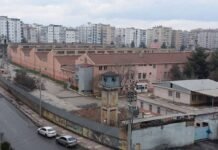Turks living outside their home country have relied heavily on social media for news about relatives who were affected by earthquakes that struck southeastern Turkey on February 6, while regular phone lines were down, The Washington Post reported.
In an interview with The Post Merve Kayıkcı, research director of Stockholm Center for Freedom, said her own relatives remained trapped under their building. Kayıkcı, who lives in Europe, explained that they were following the situation thanks to updates shared by relatives on Instagram, Twitter and Facebook.
Criticizing Turkish authorities for being slow in mobilizing rescue operations in the region, Kayıkcı said social media was the only way to reach loved ones.
Turkey’s most powerful earthquake in almost 100 years, which struck near the city of Gaziantep in the early hours of February 6, has so far claimed the lives of more than 41,000 people in Turkey in addition to injuring in excess of 100,000. Close to 220,000 disaster victims have been evacuated from the region to date, according to the latest official figures.
The 7.8-magnitude earthquake was followed by dozens of aftershocks, including a 7.5-magnitude temblor that jolted the region in the middle of search and rescue efforts the same day.
In the first three days following the earthquake telephone lines and internet connections were down, sparking public outrage. Nearly 30 percent of base stations in the region were either severely damaged or stopped working, which restricted the ability of people under collapsed buildings to call for help.
In the aftermath of the disaster, the Media and Law Studies Association (MLSA) filed a complaint against GSM operators for gross negligence and involuntary manslaughter. According to MLSA, GSM operators have a constitutional duty to be prepared for natural disasters and crises. They demanded to know why channels of communication were cut off in the most crucial hours after the disaster. They also wanted clarification on whether GSM operators had an emergency plan to put into effect in times of crisis.
Speaking to BBC Turkish service, telecommunications expert Füsun Sarp Nebil said communications infrastructure was insufficient in Turkey. “The whole country relies on Türk Telecom’s infrastructure,” she said. “This creates huge problems, because when there is a technical problem with Türk Telecom, there are no other networks to substitute.”
Nebil said the government granted Türk Telecom, a state-owned telecommunications company, privileges to establish communications infrastructure across the country until 2026, which forced other companies to work within their infrastructure.
One telecommunications expert who wanted to remain anonymous said Türk Telecom did not have the capacity to serve the entire country and that this posed a great risk in times of crisis.
Despite fundamental problems in regular communication channels after the earthquake, the Turkish government turned down help from businessman Elon Musk, who offered to send the Starlink satellite which provides internet access coverage. Nebil criticized this move, saying Starlink would have provided smoother communications and ultimately helped save more lives.













